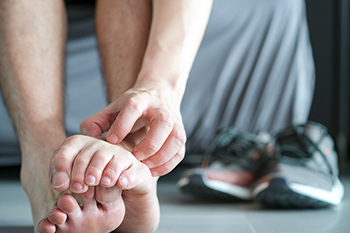
Athlete's foot is a fungal infection affecting the skin on the feet, often caused by the fungus tinea pedis. It thrives in warm and moist environments, making public showers, locker rooms, and swimming pools prime locations for infection. The condition typically causes itching, redness, and scaling between the toes, and can sometimes spread to the soles of the feet. The primary cause is exposure to the fungus, which can be contracted from contaminated surfaces or by sharing footwear. Individuals with sweaty feet or compromised immune systems are at higher risk. To address athlete's foot, start with antifungal treatments, available as creams, powders, or sprays. Keeping feet clean and dry is key and you should wash your feet daily, dry thoroughly, and change socks frequently. Wearing breathable, moisture-wicking socks and avoiding tight, non-ventilated shoes can also help. For persistent or severe cases of athlete's foot, it is suggested you schedule an appointment with a podiatrist for a more advanced treatment plan, which may include prescribed medication.
Athlete’s Foot
Athlete’s foot is often an uncomfortable condition to experience. Thankfully, podiatrists specialize in treating athlete’s foot and offer the best treatment options. If you have any questions about athlete’s foot, consult with one of our podiatrists from Parkwood Podiatry. Our doctors will assess your condition and provide you with quality treatment.
What Is Athlete’s Foot?
Tinea pedis, more commonly known as athlete’s foot, is a non-serious and common fungal infection of the foot. Athlete’s foot is contagious and can be contracted by touching someone who has it or infected surfaces. The most common places contaminated by it are public showers, locker rooms, and swimming pools. Once contracted, it grows on feet that are left inside moist, dark, and warm shoes and socks.
Prevention
The most effective ways to prevent athlete’s foot include:
- Thoroughly washing and drying feet
- Avoid going barefoot in locker rooms and public showers
- Using shower shoes in public showers
- Wearing socks that allow the feet to breathe
- Changing socks and shoes frequently if you sweat a lot
Symptoms
Athlete’s foot initially occurs as a rash between the toes. However, if left undiagnosed, it can spread to the sides and bottom of the feet, toenails, and if touched by hand, the hands themselves. Symptoms include:
- Redness
- Burning
- Itching
- Scaly and peeling skin
Diagnosis and Treatment
Diagnosis is quick and easy. Skin samples will be taken and either viewed under a microscope or sent to a lab for testing. Sometimes, a podiatrist can diagnose it based on simply looking at it. Once confirmed, treatment options include oral and topical antifungal medications.
If you have any questions, please feel free to contact our offices located in Brunswick and Hinesville, GA . We offer the newest diagnostic and treatment technologies for all your foot care needs.
